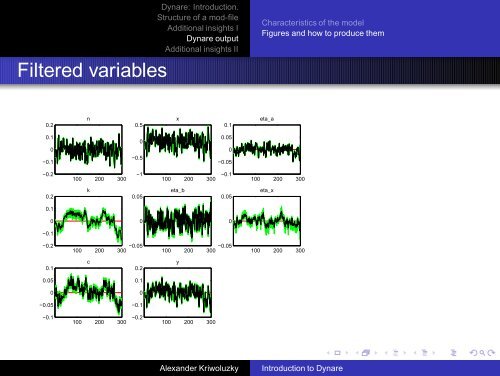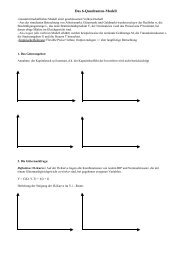Introduction to Dynare
Introduction to Dynare
Introduction to Dynare
You also want an ePaper? Increase the reach of your titles
YUMPU automatically turns print PDFs into web optimized ePapers that Google loves.
Filtered variables<br />
0.2<br />
0.1<br />
0<br />
−0.1<br />
−0.2<br />
0.2<br />
0.1<br />
0<br />
−0.1<br />
−0.2<br />
0.1<br />
0.05<br />
0<br />
−0.05<br />
−0.1<br />
n<br />
100 200 300<br />
k<br />
0.5<br />
0<br />
−0.5<br />
−1<br />
−0.05<br />
100 200 300<br />
c<br />
0.05<br />
0<br />
0.2<br />
0.1<br />
−0.2<br />
100 200 300<br />
0<br />
−0.1<br />
<strong>Dynare</strong>: <strong>Introduction</strong>.<br />
Structure of a mod-file<br />
Additional insights I<br />
<strong>Dynare</strong> output<br />
Additional insights II<br />
x<br />
0.1<br />
0.05<br />
−0.05<br />
−0.1<br />
100 200 300<br />
eta_b<br />
−0.05<br />
100 200 300<br />
y<br />
100 200 300<br />
0<br />
0.05<br />
0<br />
Characteristics of the model<br />
Figures and how <strong>to</strong> produce them<br />
eta_a<br />
100 200 300<br />
eta_x<br />
100 200 300<br />
Alexander Kriwoluzky <strong>Introduction</strong> <strong>to</strong> <strong>Dynare</strong>



